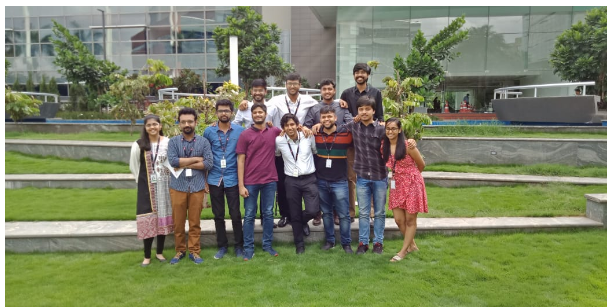

Body of IITR

‘The beginning is the most important part of the work. Let’s start with something depressing and end on a happier note.’
I think the above lines well summarize my hunt for what you call a ‘good’ internship. By the end of the summer of my second year, like any other sophomore student of the Department of Chemical Engineering, I was all set and excited to sit for ITC, RB, AmEx, and Schlumberger in the internship season. Who knew that things were just about to take a turn?
I had a good time at the Centre for Analytical Finance at the Indian School of Business, Hyderabad (My 2nd year summer internship). I enjoyed my work over there on trading strategies, building valuation models, and studying Corporate Finance. It was a pleasant experience, indeed. How did I land there? So, for the first two years of my college life, I was majorly involved in fest and event organization, what you call good for management profiles. I was part of the core teams of Cognizance and TEDxIITRoorkee. It is something that I’m really proud of, but I had started getting the feeling that I also need to learn something, gain some skills and acquire technical knowledge. Mathematics and numbers have always fascinated me. I had some exposure to Economics because of the elective course offered in the second year. So, I started dropping emails to professors at IIMs and ISB, who were working in this domain. Luckily, I got acceptances from both, and chose the latter one, because of the project there being more related to analytics, something I ardently wished to get a good hands-on experience on!
By the time my ISB internship was over, I started to ponder if this was the field I wanted to explore more, provided my deep interest in Mathematics. To be honest, I was really confused. From the first year, we have grown up seeing examples of “machau” seniors getting placed at ITC, Schlumberger, Goldman Sachs etc, and with the ever-increasing coding culture of IITR, I had three-spiked fork in front of me - Prepare for core companies (I felt I had a good chance with a decent CGPA and profile), start competitive coding and sit for software roles, or choose the path I recently started liking by learning more of Finance.
By the time I returned to the campus, most of my friends were into competitive coding, and here I was, all directionless, thinking what to start with. So I started talking to my seniors, friends, and family members I trust, and believe to be my well-wishers. Some of them said things like: Anant kaha ye sab karega, coding kar, August tak on-campus intern lagegi, meri guarantee. Some said, Anant, try kr skta hai, boht time hai, nahi hua to kuch na kuch to kr h lenge. I spent nearly 10 sleepless nights, thinking about what to do, alongside preparing for core, doing a bit of competitive coding, and general aptitude puzzles. I knew then that it could not go ahead the same way and crossing the fork had become the need of the hour. That’s when I met one of the seniors in our library, motivating me, pushing me hard to study finance and explore the field without taking unnecessary pressure. Certainly Lord ‘Ram’ for this ‘Hanuman’. I still remember his words “Tu padh, teri acchi intern me lagvaunga”. I feel myself lucky to have such seniors, friends and family members who were always there for me. After sitting half-heartedly for some companies, I finally decided to study Finance seriously, and go for it in full throttle. I dropped any hope of getting an on-campus internship for the role I was looking for. That was when HSBC came, the first time to recruit interns from IITs. With prior experience of work at ISB, I knew this was a golden opportunity for me.
HSBC came in the first week of September, and roughly I had about 10-12 days for the preparation.
In the job description, it was mentioned that they were looking for someone with good analytical skills, strong mathematical background (Probability & Statistics), and basic programming skills (C++ or Python).
I made sure that I’m well prepared with the concepts of Probability and Statistics (Expectation, Random Variables, Bayes Theorem, Conditional Probability, Different type of Distributions (Normal, Poisson, Lognormal etc), Central Limit Theorem and Hypothesis Testing). For Quant roles in firms like HSBC, JPMC, GS I feel one should also be thorough with the concepts of Engineering Mathematics- Calculus (Taylor series, Beta-Gamma functions, Line Integral, Solving PDEs), Matrices (Eigenvalues, Eigen Vectors, Rank of a Matrix), and Vector Calculus. So I revised the content of MAN-001 & 002 courses taught in the first year, and also went through Permutation and Combination from JEE syllabus.
I feel Probability, Statistics, P&C, Calculus, Matrices and general aptitude puzzles (from GeeksforGeeks and InterviewBit ) are the ones which will help you ace the interview. Apart from this, they are looking for basic programming skills in C++ and Python (Basic Data Structures– Array, Linked list). So make sure you are well prepared on these fronts.
For all those who are afraid of coding, or don’t want to code like me until 2nd year, let me share my experience with you: I learnt it during my ISB intern, when I was asked to code in Python, that it’s just a tool to express what you think or strategise, just like a poet expressing his emotions by writing. It’s inevitable. When you are doing complex, lengthy calculations you have to use it. You can’t do it manually. You have to code your algorithm or what you call ‘strategy’. So it is better to start off with writing basic codes. It’ll help you in the long run. Maybe it’s like Inorganic Chemistry of the JEE Syllabus. You have to study, to excel at some point.
Last but not the least about the preparation part, you should be well aware of every word you write in your resume. Be well prepared with the projects you have done in the past because you will be grilled on them.
Preparation strategy can be unique to every individual, I feel. I think what helps is taking the ball in your court, and playing on your strengths alongside what company is looking for. This is the trick always.
We didn’t have a screening test (procedural variations may be expected). There was a resume shortlisting round, followed by 2-3 rounds of interview. The resume shortlisting made it pretty clear that they were looking for students who have an interest in Mathematics, Data-Science, Data-Analysis and Business Problem solving (students who have demonstrated the same through an intern or project).
So a CGPA above 7, a decent profile, justifying your interest in any of the above field should get you through the resume-shortlisting. 25 students were shortlisted from our batch for the interviews.
First-round was what we call the ‘Technical-Round’, and was about questions from the topics I mentioned above to prepare (along with puzzles), and about how well you have understood your previous projects. 10 students were shortlisted after this round.
The second-round was Technical + HR. It consisted of questions on my project at ISB, how would I improvise on that project, and then the questions on my campus life. “What have you done in the past two years?” and routine HR questions- “Tell us something about yourself”, “Where do you see yourself 5 years down the line?”, “You are from Chemical Engineering Department, why do you want to work for our bank?”. The fact that the panel made me comfortable, from the very beginning, I feel, is the reason that I was able to answer those questions fluently. Prepare these basic questions well. You don’t want to spoil all your hard work by approaching these questions in a wrong way, right!
After all the grilling, three students were finally selected. We were also given a CHAPO at The Rustic House. It all ended on a happier note, isn’t it!
I was excited. Yes, I was going to work for a multinational bank, which has a glorious history of over 150 years, and is the largest in terms of market value in Europe (by 2018).
Little did I know, that the first ATM in India was set up by HSBC. Also the fact that you need to have an astonishing minimum balance of INR 1.5 Lakh, to open a bank account with HSBC. With all these facts, perks of a healthy stipend and free accommodation for 14 days in a lavish hotel, I was all set for the summers.
HSBC is organised within four business groups namely, Commercial Banking, Global Banking & Markets, Retail Banking & Wealth Management, and Global Private Banking. I worked for Global Banking and Markets Front Office, Bangalore.
We were a total of 14 interns from 4 different IITs and were assigned projects divided broadly into 3 asset classes: Equities, Fixed Income (FI), and Foreign Exchange (FX). I was a part of the FX-Overlay team. HSBC is one of the biggest interbank players and market makers in the USD/INR market. I was assigned a project directly from the London office. In fact, all of us were assigned projects from different global hubs: London, New York, and Hong Kong.
For all you should know, FX-Overlay desk deals with hedging the currency risk of a portfolio, which a global investor holds, with the assets denominated in the foreign currency. I was engaged in a mix of analytical work and coding/prototyping. I developed a backtesting tool for the hedging strategy that HSBC uses for its clients. I’m bound by the compliance issues that HSBC takes very seriously, not to disclose anything about the project, but I can definitely say that the project I worked on was intellectually challenging & exciting. Initially, it was a bit difficult to grasp the concepts, but it all ended on a happier note when I finally developed the backtesting tool in Python.
Coming to the fun part, Bangalore’s nightlife is happening and LIT, I must say. All the interns were invited for a “Cocktail Dinner” at one of the most sumptuous cafes in Bangalore. There, we could ask for anything, as much as we wanted to. (I meant snacks of course :P)

On the first day, my mentor said: Dekh hum 2.5 logo k team hai. 2 me, 0.5 tu. The journey from this to introducing me to one of his colleagues as his deputy boss (on a lighter note, of course), I think we connected really well. I had a fantastic learning experience, and will always cherish the time I spent with my team, mentor and co-interns. HSBC has a policy of open-desk culture, no cabins. You can easily reach out to anyone, and ask for guidance. I was in touch with people having worked for HSBC for more than 25 years and were at senior most positions in the organization.
We all talk about organizations being loyal, caring to their employees, and a healthy work culture. Just once incident, that I’ll preserve with me for a lifetime. So, I went to the office on one of the weekends. (Nobody asked me to :p). AC of the floor was shut down because no one was there. I asked the staff team if they could do something about it. A guy brought a table fan, from the first floor to the fifth floor for me.
HSBC, you have been special in many ways. From taking care of me to boosting my confidence that I can do anything. I’ll always be thankful to you :)
I know that the internship season can be stressful, too much, sometimes. The two main reasons behind that, which I feel, are lack of patience & awareness and The Peer Pressure. If you can get yourself on terms with these two, you are already halfway down, I feel. Please don’t panic, if you don’t land somewhere in the first week or month maybe. There are enough opportunities for all of us. Just be aware of what you are expecting out of this internship season, prepare in one direction sincerely, be focused, have patience, don’t get influenced by what others are doing. Have confidence and faith in yourself and you will come off with flying colours :)